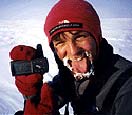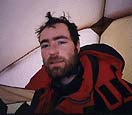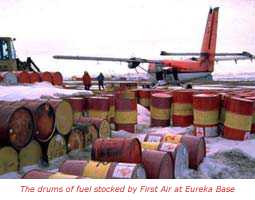|
|||||||||||||||||||||
|
|
|
|
TRANSARCTIC 2000
Tuesday 13 June / 10am : At this moment in time, the two Frenchmen have not yet reached Resolute Bay, but we know that the Canadian chopper that had accepted the mission had put down at their base camp without any difficulty and that they finally received assistance yesterday evening. On the other hand, we have some information about last Saturday's Twin flight; it was, by all accounts something of an epic! Because when executing the first TOUCH AND GO, the plane's windows smashed into smithereens because of some large pieces of ice that crashed violently into the propellers. And, what's more, when the machine got back to Eureka, there was a powerful storm blowing over the region and the pilot was flying practically blind at the moment of touchdown. It was a miracle that the landing ended up OK. One has to say that the Canadian pilots that carry out these operations are past masters of this type of manoeuvre. Our following of this expedition comes to an end with this latest communiqué.. Sunday 11 June / 6 pm : Yesterday, Saturday 10 June, the Twin of First Air made a renewed attempt to go and look for the two Frenchmen who were still on the ice cap - there was a favourable weather window.
09 June / 8 pm : Yesterday evening, Thursday, everything was ready for the Twin Otter that was going to look for Arnaud and Rodolphe to take off from Resolute Bay. There was a 12-hour good weather window and despite some extremely intense solar activity of the kind to prevent all radio communication between the planes, the Twin took off all the same. After the traditional refuelling stop at Eureka, the Twin set off for the rendezvous area marked out by the two Frenchmen - or rather marked out by Rodolphe because Arnaud, for his part, was still unable to walk. But a quarter of an hour before arriving, the pilot and his crew were caught up in a dense fog. The machine continued on its way nevertheless; it was thus that they were able briefly to fly over the camp set up by the two men without having a chance of landing.. There is no great problem landing with a Twin on this type of surface - soft ice and wet snow. But taking off is a different story. The plane's skis get embedded and stick to the snow, preventing the plane from taking off over a short distance. 07 June : Yesterday afternoon at approximately 85°08'N and 71°00'W. When the two men continued on their way notwithstanding, Arnaud Tortel, who was advancing a fair distance ahead of his companion Rodolphe, had a serious fall while crossing a hummock, because of exhaustion, no doubt. Pulled by its weight, his sledge hit his head causing cerebral concussion. When, a few minutes later, Rodolphe reached him, Arnaud was still in a semi-unconscious state. He was rambling and had blood on his face. Once he had finally regained his senses, Arnaud was obliged to report that the situation, without being too calamitous, was however serious; he had a wicked sprain in the knee and a bent rib. Rodolphe immediately switched on the Argos beacon. And started to seek out a favourable landing area for the rescuers. Things were however not quite as bad as they seemed because that same evening, Arnaud was able to reassure his loved-ones at Dieulefit by telling them that, even if he couldn't walk any longer, he was still able to look after himself: acupuncture and knee bandages. He had also been able to join up with Christian de Marliave (Cercles polaires Expéditions) who was looking after the expedition's logistics. "It hurts him when he talks", Christian told us this afternoon, "but Arnaud knows how to deal with such situations…." 6 June : We know however that Arnaud and Rodolphe are on the verge of giving up. They would be incapable of continuing their expedition, both on account of the breaking ice and the chaotic, indeed impassable terrain. Proof: each day, the two men fall at least twice into the water. That is of course more serious when the ambient temperature is around - 40°C. But even so, having to walk in wet clothes when it is freezing facilitates neither somersaults nor movement in general. In this case, the expedition would therefore, in terms of bare results, be a failure. If however one talks in terms of a mental-physical bonding between the pair, on the other hand - and on this subject we won't have to wait for confirmation before talking about it - this trek will in the eyes of all remain a very fine feat. All of this should of course soon be confirmed. But we fear that the website will no longer be supplied… While waiting for what he has to say, what we can already say is that the Hubert-Dansercoer pair, which is going to attempt, in 2002, a still more difficult adventure (a journey of more than 1,000 km) - should be setting off for the ice far earlier in the year than was the case with the Norwegians who, it must be said, went to the limits. That should situate the beginning of the Belgian expedition towards the middle of January 2002. 02 June : Since 31 May, no further contact with the French expedition.
With the passing of time, Arnaud and Rodolphe are making slower and slower, and harder and harder, progress. They are hampered, as one might imagine, by the gentleness of the temperatures that are oscillating around -2° and -5°C and melting the ice cap and blocking their path with all the open water they have to cross by transforming their sledges into amphibious boats. Other obstacles arrive to add to these difficulties; the days of whiteout that seem increasingly numerous, the unwelcome drifts taking them in the wrong direction (on 30 May, they again regressed 6 km!), the ever-sharper hunger pangs because if they want to reach their goal they have to ration their food supplies, despite the three revictualling operations that they had on the way. On this subject, this is what their three daily rations were reduced to: I spoonful of oatflakes, I spoonful of sugar, 8 nuts, 4 raisins and 1 cereal bar that they had to divide in two!
If the two Norwegians were suffering pain and paralysis from the weight of their backpacks - I would remind those that do not necessarily follow all the polar expeditions that the two Vikings had abandoned their sledges in order to make faster progress over the ice cap - the Frenchmen, for their part, were thoroughly fed up with the drifting of the ice, which was costing them precious time. A situation at the very least difficult to tolerate when they were already up to their teeth in the fight for survival on the ice cap: on 14 May, they walked for 10 hours and covered 20 km in the day. Good progress. But when they were making their calculations, the GPS displayed a different position: instead of covering the 20 kilometre-markers as expected, they had only covered 10 as the ice cap had taken them back … 10 kilometres! Exasperating, to say the least. This meant that the daily average was 1 kph! Not overly reassuring, especially when one had a further 500 km to go to reach their target and, with the help of the season, the ice cap was breaking up more and more. The previous day, the same thing: in 9.5 hours of walking, they only progressed 11 km. On 18 May, during the first 5 hours of progress, they gobbled up 13 km, during the next 5 hours, only 2 km… And then on 21 May, there was Tortel's fall into the water… Up to his neck, this time, and with skis on his feet! The extract from the communiqué is worth reading: "They were however walking very well but were stopped not by the whiteout but by Arnaud. This time, he really went through into the water. He was
|







 advancing in front of Rodolphe, when suddenly the ice gave way beneath him. He fell into the water with his skis on his feet and with his sledge. He was up to his neck in water. To get something to hold on to, he tried to get to a block of ice that was floating nearby . He succeeded by making little movements like the breaststroke. But with his skis on his feet this was very difficult. At the time, he was not really afraid, but had a funny feeling realising that the water was 4,000-meters deep beneath his feet. He remained immersed in the Arctic Ocean in this way for a good twenty seconds. Fortunately, Arnaud did not feel the cold of the water because it hadn't had time to penetrate all the layers of clothing. Helped by Rodolphe, he managed to reach the edge, him, his skis, his straps and his sledge. Tortel of course had had to undress to dry himself. To be more exact, to allow his clothes to freeze so that he could brush them clean as the water doesn't evaporate, it freezes. Picture yourself in your birthday suit in the icy cold. It takes a long time to dry. So they had to set up camp
advancing in front of Rodolphe, when suddenly the ice gave way beneath him. He fell into the water with his skis on his feet and with his sledge. He was up to his neck in water. To get something to hold on to, he tried to get to a block of ice that was floating nearby . He succeeded by making little movements like the breaststroke. But with his skis on his feet this was very difficult. At the time, he was not really afraid, but had a funny feeling realising that the water was 4,000-meters deep beneath his feet. He remained immersed in the Arctic Ocean in this way for a good twenty seconds. Fortunately, Arnaud did not feel the cold of the water because it hadn't had time to penetrate all the layers of clothing. Helped by Rodolphe, he managed to reach the edge, him, his skis, his straps and his sledge. Tortel of course had had to undress to dry himself. To be more exact, to allow his clothes to freeze so that he could brush them clean as the water doesn't evaporate, it freezes. Picture yourself in your birthday suit in the icy cold. It takes a long time to dry. So they had to set up camp